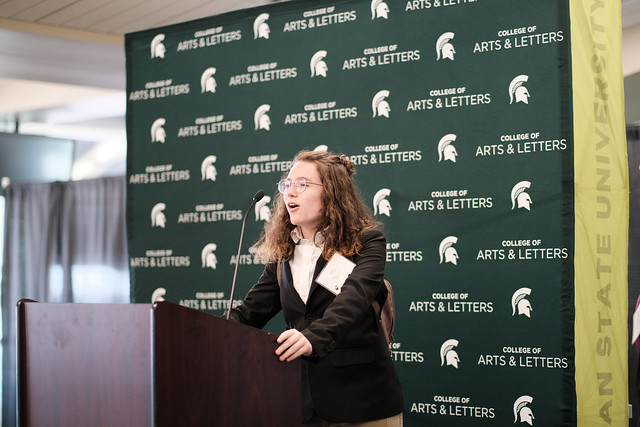
The College of Arts & Letters hosted its first Creative Arts and Research Forum on March 22, giving 45 undergraduate students the opportunity to showcase their research within the creative arts and humanities while developing professional presentation skills and practicing formal public speaking through lightning talks and poster presentations.
At the end of the forum, awards were presented to the following selected students: Mia Taylor, Abby Jaroszewicz, Cassie Feith, Isis Woods, Tori Hopper, Lauren Powell, Haydn Ramey, Adriana Cortese, and Katelyn Kroeger. The awards ranged from $200 to $750.
Mia Taylor – First-Year Citizen Scholar Award and 2nd Overall for Lightning Talks

Mia Taylor’s research project revolved around the International Dialects of English Archive (IDEA). The project went into detail about what the archive is used for and how IDEA provides accurate dialect samples to be uploaded and accessed by people around the world.
“One of my career goals is to one day become a professional dialect coach to help actors develop an accent that is not their own for a show they are working on,” Taylor said. “I was drawn to this area of research when I found out that my faculty mentor in the Department of Theatre, Deric McNish, was a dialect coach himself. He told me about this opportunity to collect samples for IDEA and I immediately was interested. The research fits in perfectly with my personal interests and my career goals.”
To me, the awards show that hard work pays off, especially if it’s something you’re passionate about.
MIA TAYLOR, FRESHMAN THEATRE MAJOR
Taylor, a freshman Theatre major, collected samples for her research by finding a good representative of a certain region. From the sample group, she asked participants about certain demographics like gender, culture, and level of education. She then recorded them reading a passage with every English phoneme in it and asked a few open-ended questions to capture some of their “natural” voice.
“To me, the awards show that hard work pays off, especially if it’s something you’re passionate about,” Taylor said. “I’m extremely grateful for the awards and the opportunity to listen to everyone else’s research at the forum.”
Abby Jaroszewicz – 1st Overall for Lightning Talks

Abby Jaroszewicz, a junior English major, presented a lightning talk on her research project, Hungry Caterpillars and Desperate Mice: How Children’s Books Reflect Their Understanding of the Discourse Information, which looked at pronouns and how pronoun complexity changes as reading levels increase.
Jaroszewicz was inspired by her interest in children’s books and how the reading levels for children’s books are determined. She worked with Associate Professors of Linguistics Cristina Schmitt and Alan Munn to develop her research and connect her interest of English and books to linguistics.
For her research, Jaroszewicz examined books with varying ratings on the Developmental Reading Assessment (DSA). From there, she transcribed the books into text and identified instances of specific discourse-dependent properties, with the main focus surrounding third-person pronouns. Once certain pronouns were identified, Jaroszewicz measured pronoun complexity by distance from its antecedent.
I feel so encouraged to keep it up, because this research is important, and it seems like other people can see that too.
ABBY JAROSZEWICZ, JUNIOR ENGLISH MAJOR
The results of the research showed no correlation between the complexity of pronouns and reading level. However, Jaroszewicz concluded that publishers decide the reading levels for books, they do not consider the specific linguistic phenomenon of pronoun distance from an antecedent. Even though the DSA portrays this scale to be an example of linguistic complexity, that was not apparent from the research.
“I was very honored to be chosen as a winner. It feels incredible to have my work for the past two years validated like this,” Jaroszewicz said. “I feel so encouraged to keep it up, because this research is important, and it seems like other people can see that too.”
Cassie Feith – 1st Place Poster Presentation

Cassie Feith’s research project focused on visual poetry in queer spaces. The project is a collection of original visual poetry and accompanying artist statements that bring together critical and creative methodologies to undertake the representation of social justice as well as embodied gender and sexual identity.
Feith’s research explores how boundaries between author and reader, production and consumption, individual and collective, as well as personal and political are blurred by examining lived experiences and critically analyzing poetic technique. Ultimately, the project addresses the violence of homophobia and transphobia in both content and form.
This award has validated all of the work I have put in over the last two semesters and affirmed my choice to be vulnerable in presenting autobiographical work.
CASSIE FEITH, SENIOR ENGLISH MAJOR
Feith, a senior English major, originally was drawn to this field of study because of her own identity markers and interest in poetics. Her work is largely autobiographical, but has implications on larger audiences as it is critical of naming queer bodies with oppressive language. She took this project as an opportunity to explore and experiment with new forms of writing under a queer theory lens.
“This award has validated all of the work I have put in over the last two semesters and affirmed my choice to be vulnerable in presenting autobiographical work,” Feith said. “I will be using this award to help fund an experiential learning opportunity this summer that allows me to continue work that I am passionate about and prepare me for life after graduation.”
Tori Hopper, Isis Woods, and Lauren Powell – 2nd Place Poster Presentation
English seniors Tori Hopper and Isis Woods and Neuroscience senior Lauren Powell are all research assistants at the Digital Humanities and Literary Cognition (DHLC) lab. Their research was based on a recent Neuroaesthetics poetry study performed by the lab, which examines the emotions, themes, and images evoked by sonnets. Using the data from this study, they chose to explore the concurrent experience of aesthetic pleasure and negative emotion.
During the DHLC lab’s poetry study, 25 undergraduate English students from Michigan State University were tasked with reading and analyzing 16 sonnets.

The study consisted of three separate sections. During the first section, participants read the sonnets with the intention of familiarizing themselves with the language. The second section required participants to read each sonnet a second time, this time highlighting words and phrases they found aesthetically pleasing in green, and aesthetically displeasing in red. As a point of reference, they were informed that the DHLC lab defines aesthetic pleasure as something powerful, pleasurable, and moving. However, participants also were encouraged to trust their instincts about their personal definitions of aesthetic pleasure based on prior experience with the phrase. After highlighting each poem during their second reading, participants were prompted to rate different qualities of their reading experience on a scale from one to 10. In the third section, participants were asked more detailed questions about the sonnets they read.
The lab found a strong statistical correlation between feelings and aesthetic pleasure based on the data collected, indicating that participants were more likely to find poems aesthetically pleasing when the poems also made them feel positive. Although this finding didn’t surprise the group, they were surprised by the outliers that showed the experience of high aesthetic pleasure concurrent with negative emotion.
Adriana Cortese, Hadyn Ramsey, and Katelyn Kroeger- First Year Student Project Award

Katelyn Kroeger and Hadyn Ramsey, both freshmen Apparel and Textile Design majors, and Adriana Cortese, a freshman Humanities-Prelaw major, won the First Year Student Project award for their project, Jean Queen.
This feminist project comprised of initial research the group completed at Wells Hall, where they displayed two white T-shirts and asked women to write down a negative comment they’ve received on one shirt and a positive comment they’ve received on the other. From these two T-shirts, the group designed a jean jacket that displayed the complexities of womanhood, with both derogatory and uplifting words scribed on the back of the jacket.


